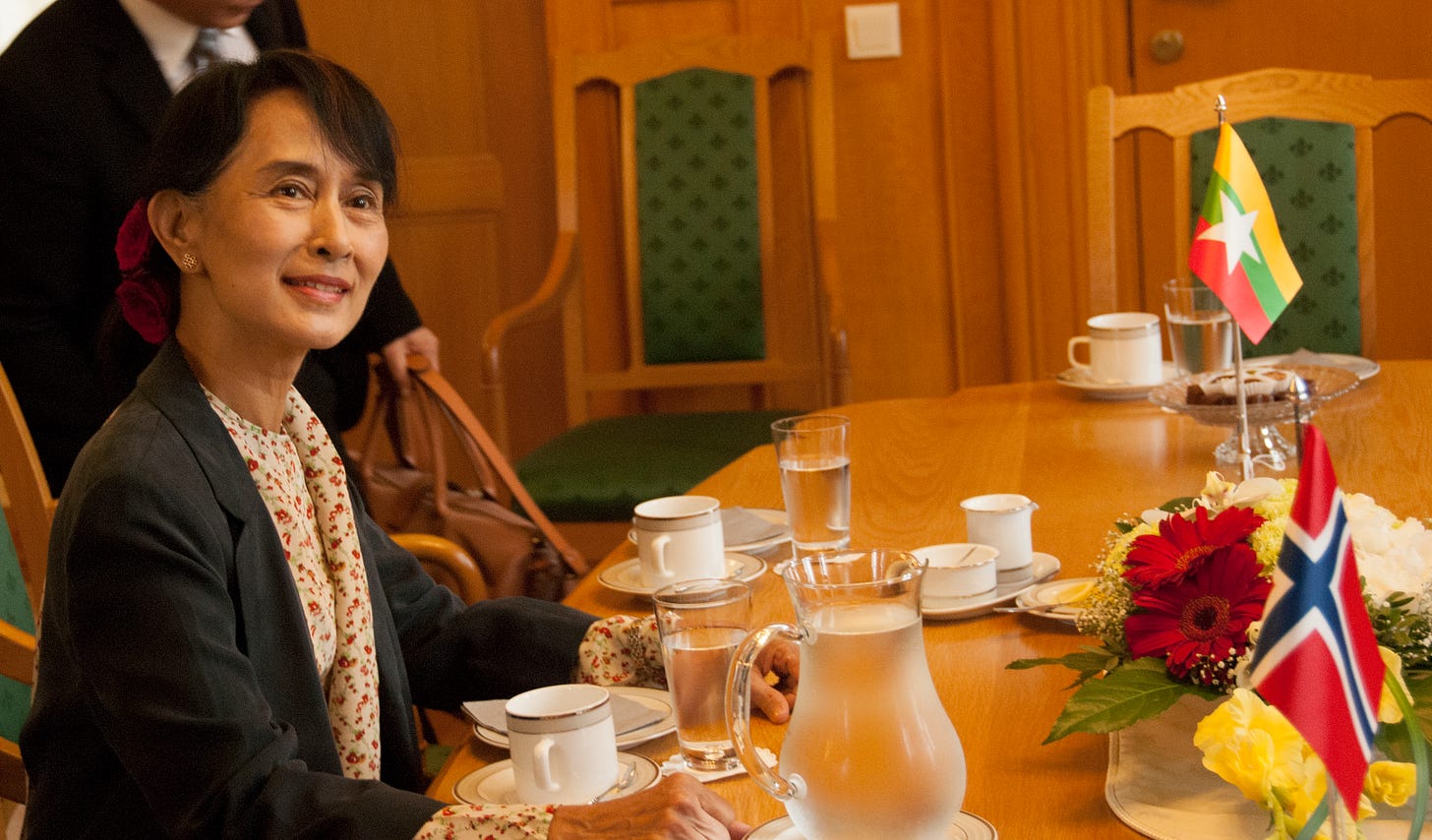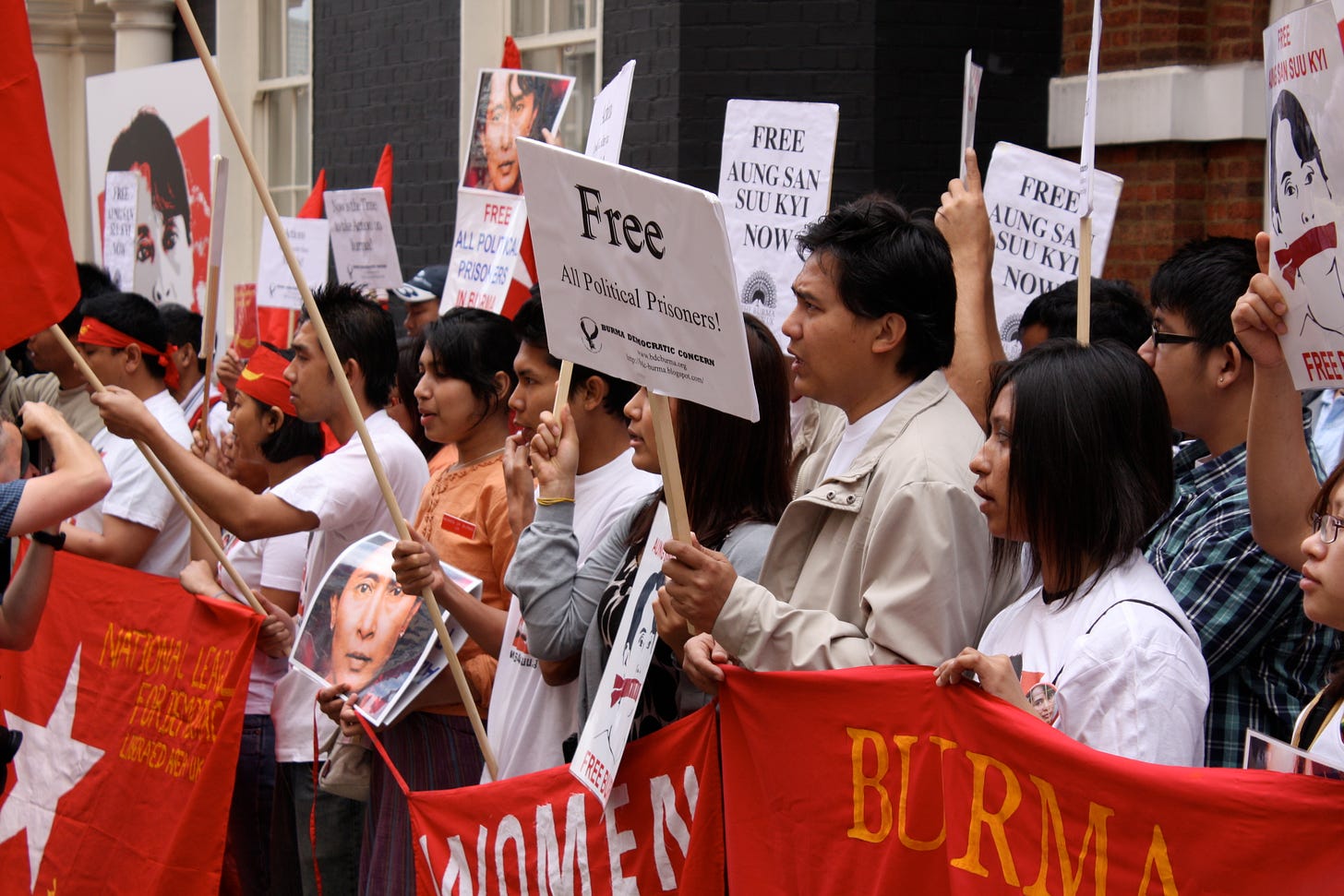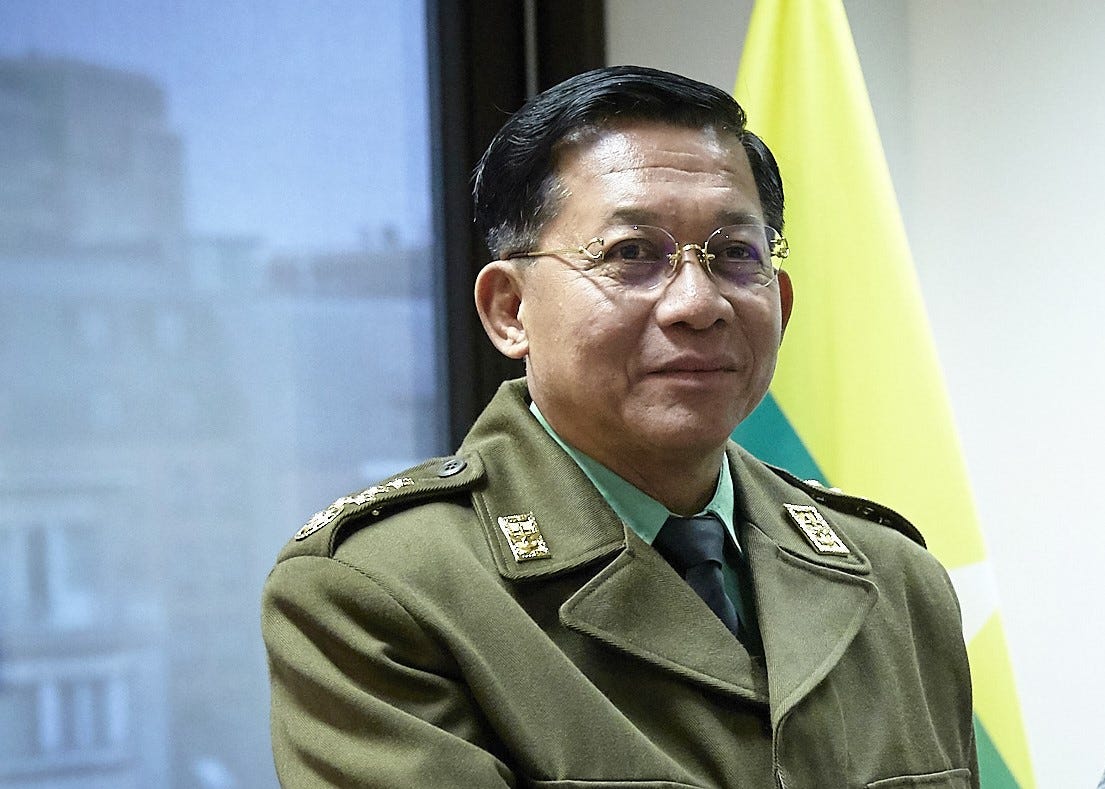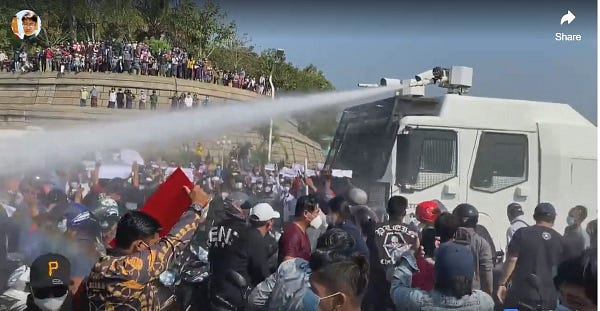Meanwhile in Myanmar
A tense power struggle thinly veiled by a curtain of democracy forced Myanmar to return to military rule
Hello! I apologize for the delay this week. I blame the software issue that stops Google Chrome from responding. Thank you for your patience and understanding.
As always, the most important parts are in bold so you can skim ahead!

For five years, Myanmar functioned as a fragile democracy, overseen by the once globally revered State Counsellor Daw Aung San Suu Kyi. But on February 1, military forces launched a coup d’etat, overthrowing the government and imprisoning politicians, critics, and activists. Myanmar was forced back to life under authoritative military rule.
In a series of early morning raids, military officials detained Aung San Suu Kyi, President U Win Myint, and federal and state lawmakers. People woke up to the military-owned television station announcing Aung San Suu Kyi was under arrest and “power had been handed over” to army chief Min Aung Hlaing who imposed a year-long state of emergency. Other international and domestic news channels went dark. Flights were canceled, airports closed, and telephone and internet services were interrupted in several cities, forcing banks to close. All the while, residents scrambled to markets to stock up on food and supplies as soldiers blocked off streets in the capital, Naypyidaw, and the main city, Yangon.

On Wednesday, Aung San Suu Kyi was formally accused of illegally importing 10 walkie-talkies, a strange and obscure allegation that showed the military's intent to weed out political opposition. For now, Aung San Suu Kyi is in two-week-long court-ordered detention, but the accusation could lead to up to three years in prison.
Go deeper: Myanmar coup: How the military disrupted the internet
A look back
Post-independence, Myanmar, then known as Burma, was democratic but in 1962, the military seized power and clamped down on democratic freedoms, creating an atmosphere of intimidation. Aung San Suu Kyi, returned to Myanmar in 1988, as the nation was seeing a massive anti-junta movement. Inspired by the protestors and her freedom-fighting father's legacy, Aung San Suu Kyi became a pro-democracy politician and rallied people behind her new National League for Democracy party (NLD). Threatened by her popularity, the junta sentenced Aung San Suu Kyi to 20 years of house arrest, promising to hold elections in 1990, confident the Burmese would vote the military back into power. But the NLD won. Confined to her home, Aung San Suu Kyi stayed politically active by addressing supporters from the edge of her fence. This effort earned her the Nobel Peace Prize in 1991.

She was released from house arrest in 2010 after the military government caved to international pressure. A series of reforms were introduced that paved the way for quasi-democracy, allowing Aung San Suu Kyi to run in the 2015 elections. When she won, the military imposed an amendment barring her from becoming president because she had a foreign-born husband and children. Instead, she became state counsellor and the de-facto leader, wielding more power than the military intended to give her. It was a moment of jubilation, as people believed Myanmar had turned the corner.
But sharing power with the military has been a tricky balancing act. After the elections, the military, known as the Tatmadaw, maintained control of the defense, border, and home affairs ministries. They also reserved a quarter of seats in parliament, giving them veto power over constitutional amendments. The Tatmadaw is not just a steadfast political player. It is weaved into society. “Not only does [the military] have its own schools, hospitals, and food production system, its elite are intermarried with business families and NLD families, creating an integrated fabric that’s almost impossible to undo,” said Richard Horsey, a political analyst in Yangon, to The New York Times. The Tatmadaw also has extensive business ventures like tourism, jade and ruby mining, timber, palm oil production, banking, drinking water, coal, and real estate.
The politics of the Rohingya genocide
In 2010, Min Aung Hlaing became the military’s commander in chief. Under his leadership, the Tatmadaw committed horrific crimes like gang rape, torture, arson, and murder of the Rohingya Muslim ethnic group from Rakhine state. Although the Rohingya had long faced persecution by the Buddhist majority and military, Min Aung Hlaing's campaign of terror emboldened militants to carry out these human rights abuses. The United Nations declared the operation had "genocidal intent," as hundreds of thousands of Rohingya fled to neighboring Bangladesh. But among Myanmar’s nationalists, Min Aung Hlaing’s popularity soared. He began eyeing the presidential seat.
Meanwhile, Aung San Suu Kyi’s international image as a beacon of democracy and champion of human rights plummeted. She didn't just fail to condemn the military’s actions, she defended them. In a 2017 interview with the BBC, Aung San Suu Kyi denied allegations of ethnic cleansing made by human rights groups. She later barred the U.N.’s investigative teams from entering Rakhine, and in 2019, at the International Court of Justice, she denounced accusations of genocide, retorting that the military was taking action against “insurgents or terrorists.”
Matthew Smith, founder of Fortify Rights, a human rights watchdog group explained to The New York Times that, “some will be tempted to think she unsuccessfully kowtowed to the military, that she defended genocidaires for political favor and still lost. Aung San Suu Kyi didn’t defend the military in court to cater to the balance of power. She defended the military, as well as her own role in the atrocities. She was a part of the problem.” Aung San Suu Kyi has a history of discriminating against the Rohingya and has suggested they were “illegal foreigners," backed by, "shadowy outside powers and who posed a danger to Myanmar’s Buddhist majority.”
In Myanmar, people weren't bothered by her disgraced international image. If Min Aung Hlaing’s popularity was soaring, Aung San Suu Kyi’s was skyrocketing. Worse still for Min Aung Hlaing, while his rival enjoyed the public's support, the U.S. slammed him with sanctions.
The power struggle

It wasn't just Min Aung Hlaing's jealousy of Aung San Suu Kyi’s popularity that prompted last week's coup. In a 2017 investigation by Al Jazeera, critics said Aung San Suu Kyi’s governing style was undemocratic and authoritarian. “It became a one-woman party,” said Avinash Paliwal, a scholar at the University of London, to The New York Times. She demanded loyalty and refused to work with those who disagreed with her views, including the military.
"Negotiations, talks, discussions and deals are not in Aung San Suu Kyi's DNA," said Khin Zaw Win, director of Yangon think tank the Tampadipa Institute to CNN. "She stonewalled everything that came from the military."
Not only did this leave practically no room for Min Aung Hlaing to rise politically, the Tatmadaw felt like Aung San Suu Kyi used them to hoist herself up higher and channel more authority towards the state counsellor rather than the president. To become president, Min Aung Hlaing needed to win the November 2020 elections. But the NLD won by a landslide. So the military’s proxy Union Solidarity and Development Party (USDP) launched a disinformation campaign, claiming there was widespread voter fraud that needed investigating.
This baseless claim was false. Given the NLD received an overwhelming 85 percent of the vote, the election commission said any irregularities that might have been present are not strong enough to change the results. Min Aung Hlaing, 65, who was scheduled to retire this summer, saw his window of opportunity closing. In the days leading up to February 1, talks between Aung San Suu Kyi and the military further deteriorated and whispers of a possible coup echoed through the country. On Monday morning, they attacked.
"This is a coup to protect their interests," said independent analyst David Mathieson to CNN. "(They thought) she has a mandate now to dilute our economic power and our constitutional power, and our immunity from prosecution. There is no way that we're going to allow ourselves to be that vulnerable."
Reaction in Myanmar
Most Burmese are shocked and angered by the coup. Michael Ghilezan, a partner of a U.S. law firm who lives in Yangon, told the BBC people, "feel deeply betrayed by the military and the USDP." A cloud of fear hovers over the country as people anticipate a return to life under military rule: one with limited rights and extensive restrictions. Seeing that activists and critics were among the arrested, several people removed the bright red and yellow NLD flags from their homes and businesses.


Meanwhile, nationalists and Tatmadaw sympathizers rejoiced. Reuters reported they were “parading through Yangon in pickup trucks and waving national flags.”
Over the past three days, thousands have participated in anti-junta demonstrations in Naypyidaw and Yangon. As people chanted “we don’t want military dictatorship,” and “long live Mother Suu,” the military blocked internet services and used water cannons to disperse crowds. On Monday, martial law was imposed in some major cities, a ban on gatherings of more than five people was implemented and a curfew was imposed.


“I don’t care if they shoot because under the military, our lives will be dead anyway,” Ko Nyi Zaw, who joined a rally on Sunday, told The New York Times. “Before we die completely, we have to protest.”
Go Deeper: Protesters Rally Across Myanmar, Defying Coup and Risking Crackdown



